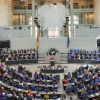Can democracy be learned?
Federal Agency for Civic Education: a former civil rights campaigner is responsible for civic education. Here you can find out whether he believes it is possible to learn democracy.

Can we learn democracy, Mr Krüger?
Thomas Krüger: Democracy itself is something every human is born with. All individuals have their own interests, and when they express them in a community, whether within the family, in their circle of friends or in the neighbourhood, they have already initiated negotiation processes that involve entering into compromises. What you need to learn about democracy is its procedures and rules.
And can you teach democracy?
Definitely! The history of civic education has shown that it is a very good means of changing mentalities and attitudes in Germany. The Allies demanded that of Germany after the Second World War. In simple terms, they wanted to transform Nazis into democrats through education. Of course, the lessons of and about democracy have changed and developed over the years. The Federal Agency for Civic Education and the state agencies, too, have always focused on major social issues. At first, that involved a confrontation with the National Socialist past, then came the education debate during the 1970s, the environmental and peace movement in the 1980s and, finally, European topics since the 1990s. Therefore, the subjects of civic education are always related to the state of society in the Federal Republic.
We are expected to provide civic education without being instrumentalised by this or that party. Democracy is based on the fundamental right to freedom – and freedom always has several options.
Did you personally have to learn democracy?
I had to and wanted to. I had to because “political education” was also practised in the GDR. However, it was organised as “agitation and propaganda” to bring citizens into line with real existing socialism. Nevertheless, there was also informal political education, which I wanted to have. Many east Germans educated themselves politically in reading circles, in discussion groups and in their neighbourhood. That’s also how it was for me; I was constantly moving in circles of that kind within the peace and opposition movement of the 1970s and 1980s. We examined all possible different positions; we read everything we could lay our hands on. You shouldn’t underestimate east Germans; they educated themselves politically using every source they could get hold of.
How do you teach democracy to less interested, perhaps educationally disadvantaged people?
You need to be a bit careful about the terms you use, because they very easily acquire pejorative undertones. But, of course, politics manifests itself at very different levels in different sociocultural settings. We’ve developed special programmes for this – for example, for different types of school so that we can reach people who don’t read much. We tend to approach them with more (moving) picture-oriented materials and less with text-based content.
Every child in Germany knows your agency’s brochures from lessons at school...
Probably. But changes in the media are also presenting a challenge for civic education. Nevertheless, today we are also reaching people that used to be almost impossible to reach. These are people who often experience politics as a disadvantage and (school) education not as a success story, but rather as a chronicle of their own failure. We can now present them with offerings that were not possible in the past. For example, we work with private TV broadcasters on television series that at first glance have nothing to do with politics. Topics like extremism, right-wing extremism, exclusion and racism emerge there and are then discussed. That works very well. However, we’ve had our greatest educational successes with web videos on YouTube. There, instead of professional teachers, we use so-called influencers who reach specific target groups with a very different kind of credibility all of their own. The focus here, too, is on subjects like Salafism, extremism, right-wing extremism or, for example, the consequences of the fall of the Wall.
These are invariably very complicated topics…
Many forms of democratic participation, of civic engagement, are initially complex. They involve complicated procedures – for example, when it comes to construction projects. Studies show that more educated people tend to get involved here. But forms of participation can also be organised in a less complex way. One example is the Wahl-O-Mat, which evaluates 38 statements online so that voters can find out which party comes closest to representing their views. This is a service that condenses the party programmes didactically and also provides playful access to engagement with politics. The Wahl-O-Mat reaches many millions of people and has become a kind of democratic popular pastime – also for people who don’t concern themselves with politics on a day-to-day basis. It’s our job to develop formats that have a low threshold and enable people to participate in democracy rather than excluding them from it.
How do you measure the success of your work?
Measuring results is a difficult matter, because the acceptance of democracy does not only depend on civic education. But we can measure whether people make use of our services. I also think that civic education plays more of a role with regard to qualitative factors. Take the climate debate, for example, which concerns very large numbers of people, often young people. Many have formed their opinion with materials from the Federal Agency; that is very clearly shown by surveys and access rates. We distribute background information and facts and reveal interrelationships. Here civic education is contributing to raising the quality of discussion to a certain standard, to engaging in a debate on the basis of arguments. This comes very close to the appeal by the philosopher Immanuel Kant: “Have the courage to use your own reason.”
Is politics in Germany satisfied with the work of the Federal Agency for Civic Education?
This question doesn’t present itself for us. We are expected to provide civic education without being instrumentalised by this or that party or government. We throw light on government positions and those of the opposition. In organisational terms, too, various committees provide safeguards against interference or bias. Furthermore, since the 1970s our work has been based on three fundamental principles. The “controversy directive” obliges us to represent issues that are controversial in society in an equally controversial way.
The so-called “ban on overpowering” requires us to educate without agitation, propaganda or bias. Finally, our focus on learners demands that we develop people’s political analytical skills appropriately on the basis of their capabilities and their education. Civic education must not be an elitist affair. Citizens should know enough arguments to be able to form their own reasoned opinion. You know, democracy is based on the fundamental right to freedom – and freedom always has several options.
Interview: Arnd Festerling
FEDERAL AGENCY FOR CIVIC EDUCATION
The Federal Agency for Civic Education (BpB) is attached to the Federal Interior Ministry and is expected to “intensify democratic awareness and strengthen the willingness for political participation”. Its most important publications include the quarterly “Informationen zur politischen Bildung”. It also provides collections of material as well as content for children, young people and adults in printed and digital form. In addition, there are videos and newsletters. The BpB organises seminars and congresses. Internationally, it participates in Networking European Citizenship Education (NECE) and Networking Arab Civic Education (NACE).
You would like to receive regular information about Germany? Subscribe here:

